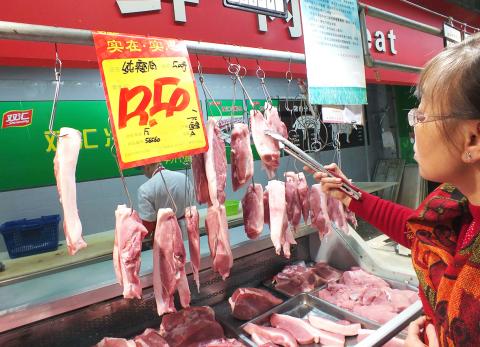China’s Shuanghui International (雙匯國際) moved to lock in a strong supply of US pork for the Chinese market on Wednesday with a deal to buy US meats icon Smithfield Foods for US$4.7 billion.
In one of the largest-ever purchases of a US firm by a Chinese company, Shuanghui, which runs China’s largest meat-processing company, will pay cash and assume debt in a deal that values Smithfield at US$7.1 billion.
That represents US$34 a share for the outstanding shares of Smithfield, a premium of 31 percent over Tuesday’s closing price.

Photo: AFP
Smithfield shares closed up 28.4 percent at US$33.35 in trade on Wednesday. Both companies said that Shuanghui’s goal was to access US pork supplies for the giant Chinese market and that Smithfield’s management would stay in place.
“Chinese consumers like American pork. US farmers want to export their pork,” Shuanghui managing director Yang Zhijun (楊志軍) said in a call with investors and journalists.
“Together we can be a global leader in animal protein... No other combination has such a great opportunity,” he said.
Smithfield chief executive Larry Pope said the deal opens up new markets for the company, headquartered in the US ham capital Smithfield, Virginia.
Shuanghui, also known as Shineway, provides a strong distribution network for the company in China and the region, he said.
Asia “is a tremendous and growing export opportunity for Smithfield,” he said.
Hong Kong-based Shuanghui International has a controlling interest in Henan Shuanghui Investment & Development (河南雙匯投資發展), China’s largest meat processor. Smithfield, which earned US$361 million in fiscal last year on sales of US$13.1 billion, is a powerhouse in US processed meat, with popular brands including Smithfield, Armour, Gwaltney and Healthy Ones.
In Europe it is known for Aoste, Campofrio and Justin Bridou brands.
Last year, China was the fourth-biggest market for US pork after Japan, Mexico and Canada, according to US Department of Agriculture data.
Shuanghui said in the announcement that it would not change the management of Smithfield after the acquisition is completed and Smithfield delisted from the New York Stock Exchange.
It said it would keep the company’s headquarters in Virginia and honor existing union agreements.
“It will be business as usual — only better — at Smithfield. We do not anticipate any changes in how we do business operationally in the United States and throughout the world,” Pope said.
The deal still needs the approval of the Committee on Foreign Investment in the US, which monitors especially security-sensitive investments from China.
It was the second-largest announced Chinese acquisition of a US company, after the giant US$28 billion sale of aircraft leasing firm ILFC to a Chinese consortium announced in December last year.
Chinese acquisitions of US companies have been rising.
In 2009, Chinese firms bought 27 US companies for US$3.3 billion, whereas last year Chinese firms acquired 49 US firms for US$11.6 billion, according to Dealogic.
The acquisition highlights growing interest in US food by Chinese consumers. Foreign food, such as milk powder from New Zealand and vegetables from neighboring Asian countries, is prized because of the frequent domestic food safety scandals in China.
In the most notorious case, six babies died and 300,000 were sickened in 2008 from drinking infant formula and other dairy tainted with the industrial chemical melamine. And Shuanghui’s reputation was battered in 2011 when state broadcaster CCTV revealed that its pork contained clenbuterol — a banned chemical that makes pork leaner but can be harmful to humans.
Additional reporting by AP

Taiwanese suppliers to Taiwan Semiconductor Manufacturing Co. (TSMC, 台積電) are expected to follow the contract chipmaker’s step to invest in the US, but their relocation may be seven to eight years away, Minister of Economic Affairs J.W. Kuo (郭智輝) said yesterday. When asked by opposition Chinese Nationalist Party (KMT) Legislator Niu Hsu-ting (牛煦庭) in the legislature about growing concerns that TSMC’s huge investments in the US will prompt its suppliers to follow suit, Kuo said based on the chipmaker’s current limited production volume, it is unlikely to lead its supply chain to go there for now. “Unless TSMC completes its planned six

Intel Corp has named Tasha Chuang (莊蓓瑜) to lead Intel Taiwan in a bid to reinforce relations between the company and its Taiwanese partners. The appointment of Chuang as general manager for Intel Taiwan takes effect on Thursday, the firm said in a statement yesterday. Chuang is to lead her team in Taiwan to pursue product development and sales growth in an effort to reinforce the company’s ties with its partners and clients, Intel said. Chuang was previously in charge of managing Intel’s ties with leading Taiwanese PC brand Asustek Computer Inc (華碩), which included helping Asustek strengthen its global businesses, the company

Power supply and electronic components maker Delta Electronics Inc (台達電) yesterday said second-quarter revenue is expected to surpass the first quarter, which rose 30 percent year-on-year to NT$118.92 billion (US$3.71 billion). Revenue this quarter is likely to grow, as US clients have front-loaded orders ahead of US President Donald Trump’s planned tariffs on Taiwanese goods, Delta chairman Ping Cheng (鄭平) said at an earnings conference in Taipei, referring to the 90-day pause in tariff implementation Trump announced on April 9. While situations in the third and fourth quarters remain unclear, “We will not halt our long-term deployments and do not plan to

TikTok abounds with viral videos accusing prestigious brands of secretly manufacturing luxury goods in China so they can be sold at cut prices. However, while these “revelations” are spurious, behind them lurks a well-oiled machine for selling counterfeit goods that is making the most of the confusion surrounding trade tariffs. Chinese content creators who portray themselves as workers or subcontractors in the luxury goods business claim that Beijing has lifted confidentiality clauses on local subcontractors as a way to respond to the huge hike in customs duties imposed on China by US President Donald Trump. They say this Chinese decision, of which Agence